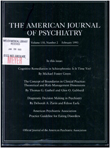Long-term benzodiazepine users 3 years after participation in a discontinuation program
Abstract
OBJECTIVE: Clinical status and use of benzodiazepines and other psychotropic drugs at follow-up were assessed in patients who had been chronically dependent on benzodiazepines and had been referred for participation in a discontinuation study. METHOD: Of 123 benzodiazepine- dependent patients screened for entry into a tapered discontinuation program, 48 had completed the program, 38 had not, and 37 had not undergone drug tapering. Follow-up information was obtained through a structured telephone interview and a mail questionnaire that included a global severity scale assessing anxiety and depression and the Hopkins Symptom Checklist. The time to follow-up was 2.7-5.0 years, and the mean +/- SD interval between screening and follow-up was 2.9 +/- 0.9 years. RESULTS: Outcome at follow-up significantly favored the patients who had completed the discontinuation program; 73% were not using benzodiazepines, compared to 39% in the unsuccessful taper group and 14% in the no-taper group. Moderate or marked anxiety was still reported by 35% of the patients who were taking benzodiazepines and 25% of those who were not. At follow-up, 22% of the patients were being treated with nonbenzodiazepine psychotropic agents, primarily antidepressants. CONCLUSIONS: The high percentage of patients who were benzodiazepine-free at follow-up and the continued anxiety and depression present in many patients suggest that some patients may have been taking benzodiazepines because of chronic or recurrent anxiety or depression, not physical dependence.
Access content
To read the fulltext, please use one of the options below to sign in or purchase access.- Personal login
- Institutional Login
- Sign in via OpenAthens
- Register for access
-
Please login/register if you wish to pair your device and check access availability.
Not a subscriber?
PsychiatryOnline subscription options offer access to the DSM-5 library, books, journals, CME, and patient resources. This all-in-one virtual library provides psychiatrists and mental health professionals with key resources for diagnosis, treatment, research, and professional development.
Need more help? PsychiatryOnline Customer Service may be reached by emailing [email protected] or by calling 800-368-5777 (in the U.S.) or 703-907-7322 (outside the U.S.).



